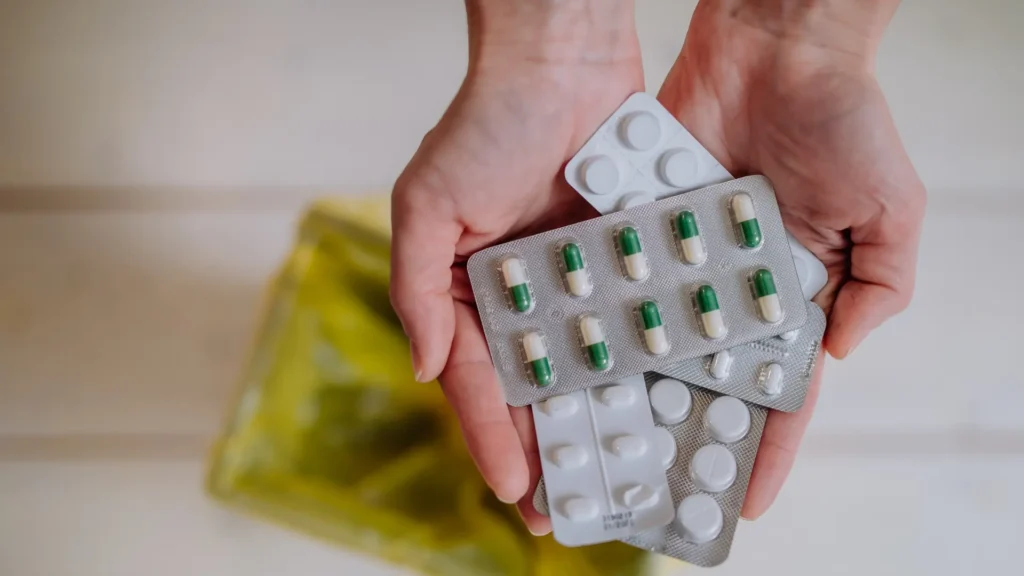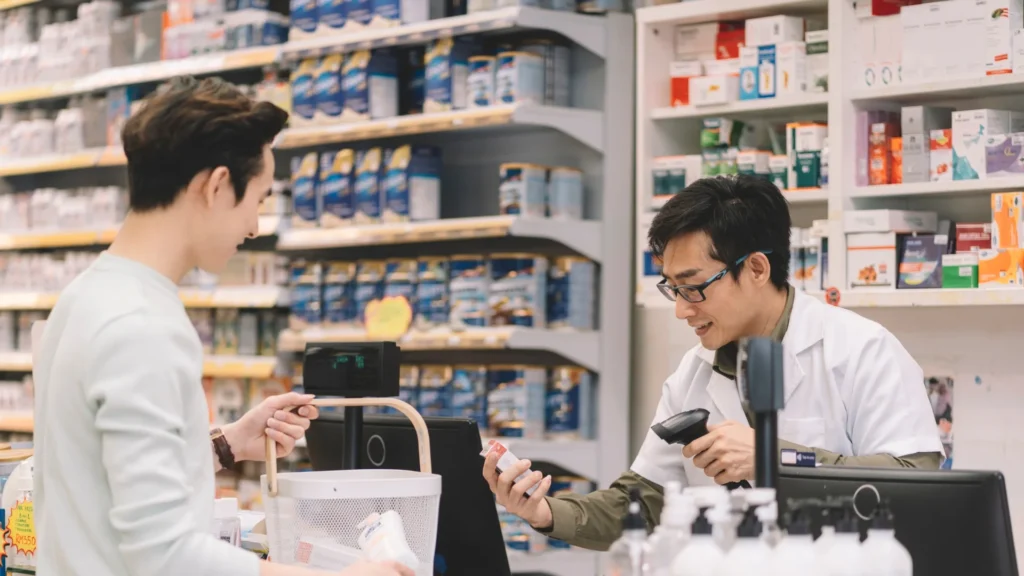TL;DR – How to Dispose of Old Medication in Singapore
- Best & safest option: Return unused or expired medicines to any medical clinic – it’s free.
- Controlled drugs (strong painkillers, sleeping pills, etc.): Must be returned to a medical clinic.
- Never flush medicines down the toilet or pour them down the sink – it harms the environment and contributes to AMR.
- Home disposal (only if you can’t return): Mix tablets with coffee grounds or cat litter, seal in a bag, and throw in regular trash.
- Sharps/needles & inhalers: Use a sharps container (available at pharmacies) and return for safe disposal.
- Bring them to MMC Clinic: We accept returns during operating hours – no appointment needed.
At MMC, we often see patients with leftover or expired medications cluttering their cabinets. Proper disposal of old medication is crucial to prevent accidental misuse, protect children and pets, and safeguard Singapore’s environment from pharmaceutical pollution.
Why should you Dispose of Old Medication properly?
Improper disposal of medicines can lead to water contamination and contribute to antimicrobial resistance (AMR). It’s a growing public health threat in Singapore.
According to Singapore’s National Strategic Action Plan on AMR (NSAPv2, launched November 2025), responsible disposal helps preserve the effectiveness of antibiotics and other antimicrobials.
When Should I dispose Expired/Unused Medication?

You should consider disposing of your medications immediately if:
- They are expired or if the expiration date is uncertain, such as when the packaging is damaged or a section of the blister pack is missing.
- Their shelf life has been compromised, for instance, due to inappropriate storage conditions.
- They exhibit signs of degradation like changes in color, odor, or texture.
- The medication is no longer needed by the prescribed individual and isn’t intended for occasional use as needed.
What to do with most Non-Controlled Medications

For tablets, capsules, syrups, creams, and ointments that are not controlled drugs (over the counter medication):
- Return them to any participating pharmacy (most community pharmacies accept them free of charge).
- Pharmacies send them for safe, high-temperature incineration, which is the most environmentally responsible method in Singapore.
What to do with Controlled Drugs and Special Cases
Controlled drugs (e.g., strong painkillers like morphine, codeine, or certain sleeping pills) must be returned to a pharmacy, hospital pharmacy or clinic for secure disposal under the Misuse of Drugs Act. Do not throw them in the trash or flush them.
What to do with Inhalers, needles, and other items

- Inhalers:
Do not throw them in the bin—residual propellant and medication can harm the environment.
Return to a pharmacy or use a designated collection point.
- Needles/syringes:
If you have needles at home, place them in a puncture-proof sharps container (available from pharmacies or Amazon) and return to a clinic or pharmacy for safe disposal.
Where to return Medications in Singapore

- Most community pharmacies (Guardian, Watsons, Unity, etc.) accept unwanted medicines.
- Public hospitals and polyclinics often have dedicated drop-off points.
- Best is to return it to the clinic that prescribed it to you. (Check with them just in case.)
- Mission Medical Clinic also accepts medicine disposal during operating hours.
What if I need to Dispose at home?
If returning is not possible:
- Remove medicines from original packaging.
- Mix tablets/capsules with an unpalatable substance (e.g., used coffee grounds, cat litter, or dishwashing liquid).
- Place the mixture in a sealed plastic bag or container.
- Throw in your household trash (not the recycling bin or toilet).
- Remove personal information from packaging before disposal.
Never flush medicines down the toilet or pour liquids down the sink—this contaminates water sources and contributes to AMR.
Disclaimer
This article provides general guidance based on current recommendations from the Ministry of Health (MOH), Pharmaceutical Society of Singapore (PSS), and National Environment Agency (NEA). Always consult your doctor or pharmacist for advice specific to your medications.
If you have old or unused medicines at home, bring them to Mission Medical Clinic today. We’ll dispose of them safely and can review your current prescriptions to reduce future waste.
Book an appointment or visit us for medication review and safe disposal.
Sources & further reading
- Pharmaceutical Society of Singapore – Safe Disposal of Medicines
- Ministry of Health – National Strategic Action Plan on Antimicrobial Resistance (NSAPv2)
- Health Sciences Authority – Controlled Drugs Guidelines
FAQ – How to Dispose of Old Medication in Singapore
1) Can I flush pills down the toilet in Singapore?
No — flushing is not allowed as it can enter waterways and contribute to antimicrobial resistance (AMR).
2) Can you throw away medication in the trash?
Yes if you are unable to return expired medicine to the clinic or pharmacy. Do not flush it down the toilet.
3) Where to donate unused medicine in Singapore?
Return them to a pharmacy or clinic. Sealed, unopened packs in specific charity programs.
4) What about expired vitamins or supplements?
Treat them the same way as other non-controlled medicines — return to a pharmacy or use the home disposal method.
5) Can you return expired medication to Pharmacy?
Yes, you generally can return expired medication to a pharmacy in Singapore, but it is for safe disposal only and not for refund or reuse.
6) Is there a national medication take-back program in Singapore?
While there is no single nationwide scheme like in some countries, most community pharmacies (Guardian, Watsons, Unity, etc.) accept returns free of charge, and the Pharmaceutical Society of Singapore (PSS) strongly recommends this method. Some hospitals and polyclinics also have dedicated drop-off points.
About the Expert

Dr Leong Choon Kit
MBBS, M.Med (Public Health), GDFM, MCFP(S), FCFP(S), FAMS(Family Medicine)
Dr. Leong Choon Kit is one of the Doctors at MMC. A dedicated physician with a background in Public Health and Family Medicine, focusing on public policy, social issues, and vaccination advocacy.
About the Writer

Timothy Leong
Timothy Leong is the writer, content editor and marketing specialist at MMC. With experience in writing and creating websites for local businesses. Basically makes sure that everything online runs smoothly.



